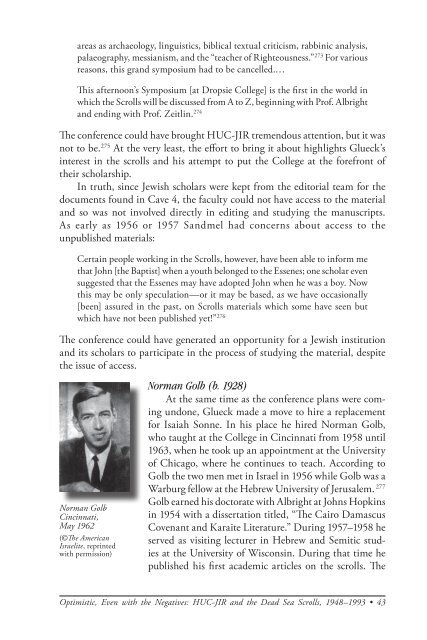The American Jewish Archives Journal, Volume LXI 2009, Number 1
The American Jewish Archives Journal, Volume LXI 2009, Number 1
The American Jewish Archives Journal, Volume LXI 2009, Number 1
You also want an ePaper? Increase the reach of your titles
YUMPU automatically turns print PDFs into web optimized ePapers that Google loves.
areas as archaeology, linguistics, biblical textual criticism, rabbinic analysis,<br />
palaeography, messianism, and the “teacher of Righteousness.” 273 For various<br />
reasons, this grand symposium had to be cancelled.…<br />
This afternoon’s Symposium [at Dropsie College] is the first in the world in<br />
which the Scrolls will be discussed from A to Z, beginning with Prof. Albright<br />
and ending with Prof. Zeitlin. 274<br />
<strong>The</strong> conference could have brought HUC-JIR tremendous attention, but it was<br />
not to be. 275 At the very least, the effort to bring it about highlights Glueck’s<br />
interest in the scrolls and his attempt to put the College at the forefront of<br />
their scholarship.<br />
In truth, since <strong>Jewish</strong> scholars were kept from the editorial team for the<br />
documents found in Cave 4, the faculty could not have access to the material<br />
and so was not involved directly in editing and studying the manuscripts.<br />
As early as 1956 or 1957 Sandmel had concerns about access to the<br />
unpublished materials:<br />
Certain people working in the Scrolls, however, have been able to inform me<br />
that John [the Baptist] when a youth belonged to the Essenes; one scholar even<br />
suggested that the Essenes may have adopted John when he was a boy. Now<br />
this may be only speculation—or it may be based, as we have occasionally<br />
[been] assured in the past, on Scrolls materials which some have seen but<br />
which have not been published yet!” 276<br />
<strong>The</strong> conference could have generated an opportunity for a <strong>Jewish</strong> institution<br />
and its scholars to participate in the process of studying the material, despite<br />
the issue of access.<br />
Norman Golb<br />
Cincinnati,<br />
May 1962<br />
(©<strong>The</strong> <strong>American</strong><br />
Israelite, reprinted<br />
with permission)<br />
Norman Golb (b. 1928)<br />
At the same time as the conference plans were coming<br />
undone, Glueck made a move to hire a replacement<br />
for Isaiah Sonne. In his place he hired Norman Golb,<br />
who taught at the College in Cincinnati from 1958 until<br />
1963, when he took up an appointment at the University<br />
of Chicago, where he continues to teach. According to<br />
Golb the two men met in Israel in 1956 while Golb was a<br />
Warburg fellow at the Hebrew University of Jerusalem. 277<br />
Golb earned his doctorate with Albright at Johns Hopkins<br />
in 1954 with a dissertation titled, “<strong>The</strong> Cairo Damascus<br />
Covenant and Karaite Literature.” During 1957–1958 he<br />
served as visiting lecturer in Hebrew and Semitic studies<br />
at the University of Wisconsin. During that time he<br />
published his first academic articles on the scrolls. <strong>The</strong><br />
Optimistic, Even with the Negatives: HUC-JIR and the Dead Sea Scrolls, 1948–1993 • 43

















